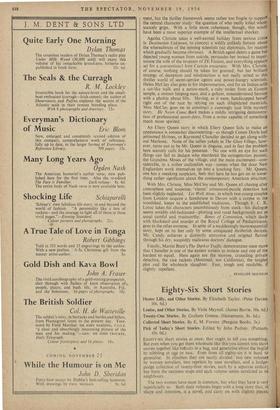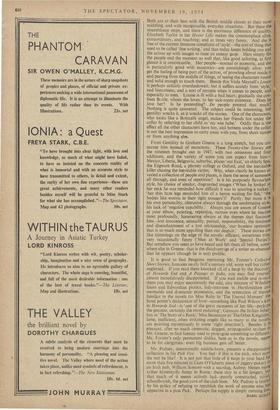Eighty-Six Short Stories
Pick of Today's Short Stories. Edited by John Pudney. (Putnam. 10s. 6d.)
EIGHTY-slx short stories at once: that ought to tell you something. But even when you get them wholesale like this you cannot toss short stories together like' bilbuits in a bag, and generalise about the bagful by nibbling at one or two. Even from all eighty-six it is hard to generalise. In numbers they are neatly divided: two new volumes by women novelists, two reprints by men novelists, and a hodge- podge collection of twenty-four stories, each by a separate author; but there the neatness stops and each volume seems unrelated to its neighbours.
The two women have most in common, but what they have is very superficially so. Both their volumes begin with a long story that, in shape and intention, is a novel, and carry on with slighter pieces.
Both are at their best with the British middle classes at their most middling, and with recognisable, everyday situations. But there the resemblance stops, and there is the enormous difference of quality. Elizabeth Taylor in her Hester Lilly makes the commonplace alive, extraordinary, and touching; and at times very funny. And she is free of the current feminine complaint of ' style'—the sort of thing that used to be called 'fine writing,' and that today keeps holding you and the action up with images to raise an uneasy gasp. Hers simply fits the people and the moment so well that, like good tailoring, at first glance it is unnoticeable. Her people—normal or eccentric, and she is particularly good with eccentrics—are astonishingly alive: you get the feeling of being part of the action, of prowling about inside it and peering from the middle of things, of seeing the characters round and solid enough to touch them. Beside this Viola Meynell's Louise is perhaps unfairly overshadowed; but it suffers acutely from 'style,. and literariness, and a sort of myopia when it comes to people, and especially to men. Louise is ill with a bad heart; gradually she con- fines Bartle, whom she loves, to her sick-room existence. Does he love her? Is he pretending?. Do people pretend that much? Nothing is quite answered. The subject could be interesting, but gentility wrecks it, as it wrecks all the stories. One of the characters, who looks like a Botticelli angel, makes her friends hot under the collar by referring to her child as 'my wee babe.' Oddly that is the effect all the other characters have too, and hotness under the collar is not the best impression to carry away with you, from short stories or from anything else.
From Gentility to Graham Greene is a long stretch, but you can accuse him instead of monotony. These Twenty-One Stories are the nineteen brought out in 1947, with two omissions and four additions, and the variety of scene you can expect from him-- Mexico, Liberia, Belgravia, suburbia, places' out East,' an elderly Spa, the Edgware Road, a phoney college at Oxford, and the inevitable killer chasing the inevitable victim. Why, when clearly he knows so varied a collection of people and places, is there the sense of sameness all through, and even of repetition? Is it his purposely flavourless style, his choice of similar, disgruntled images ('When he looked at her neck he was reminded how difficult it was to unstring a turkey, 'her thin bare legs reminded him of a heron waiting for fish,' 'the bodies like worms in their tight trousers')? Partly: but more it is his own personality, obtrusive always through the unobtrusive style, his lack .of 'negative capability.' Always you are aware of Greene at your elbow, pointing, repetitive, narrow even where he reaches most profoundly, hammering always at the themes that fascinate him—lost innocence, sensuality, pursuit, responsibility, the tiredness and disenchantment of a lost relationship, 'our baseless optimisin that is so much more appalling than our despair.' These stories are like trimmings on the edge of the novels: efficient, sometimes trite, very occasionally funny ('Men at Work' and 'Special Duties.). But somehow you seem to have heard and felt them all before, some. where else in Greene: that is the disadvantage of a writer so obsessed that he appears (though he is not) prolific.
It is good to find Penguins reprinting Mr.. Forster's Collected Short Stories, fantasies nearly half a century old; worn well but rather neglected. if you read them knocked all of a heap by the discover)", of Howards End and A Passage to India, you may find yourself almost incredulously disappointed. If you wait awhile and re-read them you may enjoy enormously the odd, airy mixture of Wiltshire fauns and Edwardian picnics, lady-into-tree in Hertfordshire and mermaids and daemonic possession, and the reiteration of themes familiar in the novels (to Miss Raby in 'The Eternal Moment' the hotel porter's declaration of love—something like Paul Wilcox's kiss in Howards End—is' one of the great moments of her life—perlvt's the greatest, certainly the most enduring'; Gennaro the Italian fisher: boy in 'The Story of a Panic,' Miss Beaumont in' The Other Kingdom, lame, inefficient, often irritating angels like so many in the novels. are pointing mysteriously in some 'right direction'). Besides it is pleasant, after so much cinematic, dogged, propagandist realism Mr. Greene, to find fantasy used to propagate something so different. Mr. Forster's only permanent dislike, here as in the novels, seems to be for clergymen: even big business gets off better.
Mr. Pudney, determinedly middle-brow, presents a disappointing collection in his Pick Five. You feel: if this is the pick, what must the rest be like? It is not just that little of it stops in your head for more than five minutes (a Liam O'Flaherty piece of jiggery-pokery an Irish pub, William Sansom with a sea-slug, Aubrey Menen being, rather hysterically funny in Rome: these stay in a bit longer), but that much of it seems actively bad—poorly constructed, schoolboyish, the good yarn of the club bore. Mr. Pudney is limited by his policy of refusing to republish the work of anyone who has appeared in a past Pick. Perhaps the supply is simply running lovb ISABEL QUICO











































































 Previous page
Previous page